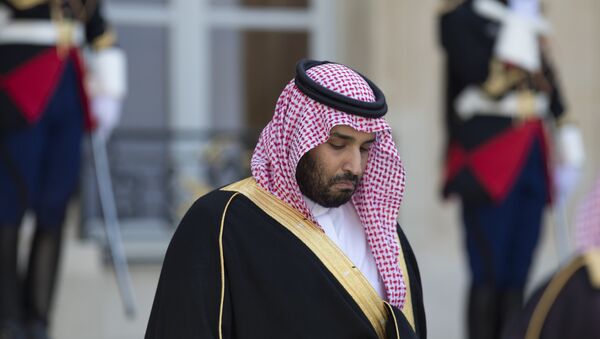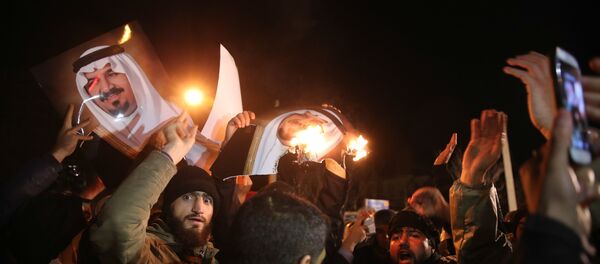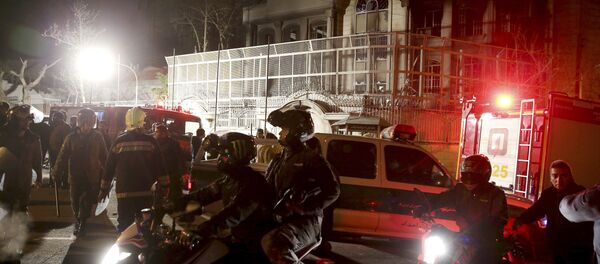The execution of Sheikh Nimr al-Nimr was a message sent by the King of Saudi Arabia both to his supporters and adversaries.
"The Kingdom has not had its Islamic revolution, a transition from a largely secular rule to a theocratic one, as in Iran in 1979… Saudi has also not seen the unpredictable upheaval of an Arab Spring. It instead has been ruled by the al-Saud family for decades," Peter Van Buren, American author and 24-year veteran of the US State Department, notes in his article for his WeMeantWell.com site.
The American author adds that it is fundamentalist Sunni Wahhabi clerics who provide "religious legitimacy" for the al-Saud family.
"But perhaps most significantly, the al-Saud family's rule is facing succession issues in the form of the deceased King Salman's newly empowered 30-year-old son, Mohammed bin Salman," Van Buren emphasizes, pointing to rumors of a possible coup against the ruling branch circulating among Saudi royalties.
In this light Riyadh needed to make a "tough" step to demonstrate its strength.
"Saudi Arabia is exhibiting the psychology of a state that risks losing its dominant position and whose losing hand is growing weaker and weaker. This explains why an otherwise rational actor begins making seemingly panicky and incomprehensible moves," US-based award winning author and president of the National Iranian American Council Trita Parsi writes in his op-ed for Al-Jazeera.
Important tweet from Saudi student in Iran. A voice of peace and understanding — and more are needed https://t.co/hMHFQSbMd0
— Trita Parsi (@tparsi) January 7, 2016
Parsi notes that it is not rising states that tend to be reckless, but declining ones. "Rising states have time on their side," he points out, adding that Tehran has demonstrated a more mature and prudent foreign policy approach, than Riyadh. The Iranian leadership has openly condemned an angry mob for attacking the Saudi Arabian embassy in Tehran after the beheading of the Shiite cleric, he adds.
Safar Ali Baratloo, Deputy Governor of #Tehran province and responsible for security affairs, sacked by Min of Interior over embassy attack.
— Adnan Tabatabai (@A_Tabatabai) January 8, 2016
By executing al-Nimr Riyadh has evidently made an attempt to provoke Tehran into making erroneous emotional moves. Furthermore, the Saudi leadership has also tried to divert public opinion from serious domestic challenges.
"Saudi Arabia is faced with a range of serious challenges, such as monarchical succession and generational shifts in royal leadership, Salafi radicalism, issues of social stability, economic shortcomings (including the expenditure of billions in foreign reserves) and questions regarding the status of the Shia minority," Inaugural Director of the Belfer Center's Iran Project Payam Mohseni emphasizes in his recent article for The National Interest.
"The Saudis see escalation with Iran, in parts, as a way to overcome these daunting challenges," Mohseni stresses, adding that Saudi leaders are determined to forge political order inside the country and beyond. However, it seems the only options they could use to achieve their ambitious objectives are Wahhabi sectarianism and bellicosity.
There is a toxic mix of hyper-nationalism and sectarianism in the region. It's already a powder-keg. Don't feed the fire.
— سلطان سعود القاسمي (@SultanAlQassemi) January 2, 2016
"Sinking oil prices (crude dipped below $32 this week) further diminish the costs for risky behavior and mute international repercussions," Mohseni notes.
Still, according to Peter Van Buren "events set in motion are difficult to control."
"But for the time being, it appears Salman has moved ahead a few spaces in a real-life Game of Thrones," the State Department veteran remarks.



